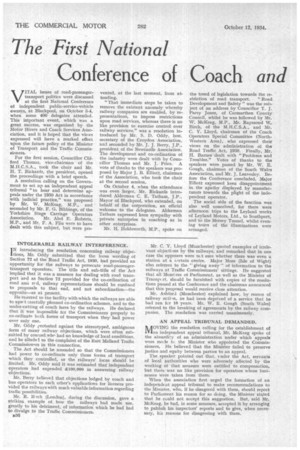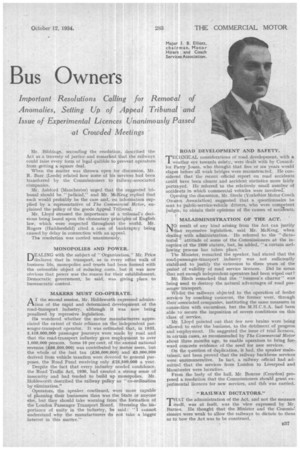The First National
Page 54

Page 55

If you've noticed an error in this article please click here to report it so we can fix it.
Conference of Coach and
Bus Owners
VITAL issues of road-passengertransport politics were discussed at the first National Conference of independent public-service-vehicle owners, at Blackpool, on October 3-4, when some 400 delegates attended. This important event, which was a great success, was organized by the Motor Hirers and Coach Services Association, and it is hoped that the views expressed will have a marked effect upon the future policy of the Minister of Transport and the Traffic Commissioners.
For the first session, Councillor Clifford Thomas, vice-chairman of the M.H.C.S.A., took the chair and Mr. IL T. Rickards, the president, opened the proceedings with a brief speech.
A resolution calling on the Government to set up an independent appeal tribunal "to hear and determine appeals under the 1930 Act in accordance with judicial practice," was proposed by Mr. W. McKeag, M.P., and seconded by Mr. F. G. Bibbings, of the Yorkshire Stage Carriage Operators Association. Mr. Aled E. Roberts, M.P., and Mr. F. A. Flin were to have dealt with this subject, but were pre vented, at the last moment, from attending.
"That immediate steps be taken to remove the existent anomaly whereby railway companies are enabled, by representations, to impose restrictions upon road services, whereas there is no like provision to exercise control over railway services," was a resolution introduced by Mr. S. D. Oddy, hon. secretary of the Croydon Association, and seconded by Mr. J. J. Berry, J.P., president of the Newcastle Association. The development and co-ordination of the industry were dealt with by Councillor Thomas and Mr. J. Price. A vote of thanks to the speakers was proposed by Major J. B. Elliott, chairman of the Association, who took the chair at the second session.
On October 4, when the attendance was even larger, Mr. Rickards introduced Alderman C. E. Tatham, J.P. Mayor of Blackpool, who extended, on behalf of the corporation, an official welcome to the delegates. Alderman Tatham expressed keen sympathy with private enterprise in coaching as in other enterprises.
Mr. H. Holdsworth, M.P., spoke on the trend of legislation towards the restriction of road transport. "Road Development and Safety" was the subject of an address by Councillor T. J. Parry Jones, of Carmarthen County Council, whilst he was followed by Mr. W. McKeag, M.P., Mr. Raymond W. Birch, of the 1VI.H.C.S.A., and Mr. C. Y. Lloyd, chairman of the Coach Operators Special Committee (NorthWestern Area), who expressed their views on the administration of the Road Traffic Act, 1930. Finally, Mr. H. Barnes dealt with "Problems and Troubles," Votes of thanks to the speakers were passed by Mr. W. E. Gough, chairman of the South Wales Association, and Mr. J. Leavesley. Before the Conference concluded, Major Elliott expressed keen disappointment in the apathy displayed by manufacturers towards the plight of the independent operator.
The social side of the function was also well conceived, for there were afternoon trips to the Leyland works of Leyland Motors, Ltd., to Southport, and to the Mersey Tunnel, whilst even • ing tours of the illuminations were arranged.
INTOLERABLE RAILWAY INTERFERENCE.
I N introducing the resolution concerning railway objections, Mr. Oddy submitted that the loose wording of Section 72 of the Road Traffic Act, 1930, had provided an opportunity for the railways to persecute road-passengertransport operators. The title and sub-title of the Act implied that it was a measure for dealing with road transport arid as Section 72 provided for the co-ordination of road ana red, railway representations should be confined to proposals to that end, and not subordination—the opposite—as at present.
He referred to the facility with which the railways are able Co upsr t carefully planned co-ordination schemes, and to the under-cutting of coach fares by the railways. He declared that it was impossible foe the Commissioners properly to co-ordinate benh forms of transport when they had power over only one.
Mr. Oddy protested against the stereotyped, ambiguous form of many railway objections, which were often submitted by coutisel who had no knowledge of local conditions, and he allude I to the complaint of the East Midland Traffic Commissioners in -this connection.
• The Act should be amended so that the Commissioners had power to co-ordinate only those forms of transport which they controlled, or the railways' locus should be limited. Mr. Oddy said it was estimated that independent operators had expended A100,000 in answering railway objections.
Mr. Berry believed that objections lodged by coach and bus operators to each other's applications for licences provided the railways with much valuable information regarding traffic possibilities.
Mr. R. B.rch (London), during the discussion, gave a striking, example of how the railways had made use, greatly to his detriment, of information which he had had to divulge to the Traffic Commissioners.
B36 Mr. C. Y. Lloyd (Manchester) quoted examples of irrelevant objections by the railways, and remarked that in one case the opposers were not sure whether there was even a station at a certain centre. Major Moss (Isle of Wight) also referrea to the "giving away" of information to the railways at Traffic Commissioners' sittings. He suggested that all Members of Parliament, as well as the Minister of Transpc rt, should be furnished with copies of the resolutions passed at the Conference and the chairman announced that this proposal would receive close attention.
Mr. Ashford (Manchester) explained how, by reason of railway actien, ne had been deprived of a service that he had run for 10 years. Mr. W. E. Gough (South Wales) referred Co the breaking of agreements by the railway companies. The resolution was carried unanimously.
AN APPEAL TRIBUNAL DEMANDED.
AOVING the resolution calling for the establishment of IVIan independent appeal tribunal, Mr. McKeag spoke of the absurdity of an administration under which appeals were made to the Minister who appointed the Commissioners. He believed that the Minister failed to preserve justice and equity between parties Co an appeal.
The speaker pointed out that, ender the Act, servants of local authorities who were adversely affected by the working of that measure were entitled to compensation, but there was no like provision for operators whose businesses were taken from them.
When the association first urged the formation of an independent appeal tribunal to make recommendations to the Minister, who, if he disagreed with them, should report to Parliament his reason for so doing, the Minister stated that he could not accept this suggestion. But, said Mr. McKeag, he had, in some measure, accepted it by arranging to publish his inspectors' reports and to give, when necessary, his reasons for disagreeing with them. Mr. Bibbings, seconding the resolution, described the Act as a travesty of justice and remarked that the railways could raise every form of legal quibble to prevent operators1 from getting a square deal.
When the matter was thrown open for discussion, Mr. R. Barr (Leeds) related how some of his services had been transftrred by the Commissioners to railway-associated companies.
Mr. Ashford (Manchester) urged that the suggested tribunal should be "judicial, and Mr. McKeag replied that such would probably be the case and, on information supplied by a representative of The Commercial Motor, explained the policy of the goods Appeal Tribunal.
Mr. Lloyd stressed the importance of a tribunal's decisions being based upon the elementary principles of English law, which were respected throughout the world. Mr. Rogers (Huddersfield) cited a case of bankruptcy being caused by delay in connection with an appeal.
Tha resolution was carried unanimously.
MONOPOLIES AND POWER.
DEALING with the subject of "Organization," Mr. Price declarea that in transport, as in every other walk of business life, monopolies and trusts had been formed with the ostensible object of reducing costs, but it was noW obvious that power was the reason for their establishment. Democratic government, he said, was giving place to bureaucratic control.
MAKERS MUST CO-OPERATE.
AT the second session, Mr. Holdsworth expressed admiration of the rapid and determined development of the road-transport industry, although it was now being penalized by repressive legislation.
He wondered whether the motor manufacturers appreciated the extent of their reliance on the independent passenger-transport operator. It was estimated that, in 1933, 5,418,000,000 passenger journeys were made by road and that the road-transport industry gave employment to over 1,000,000 persons. Some 10 per cent, of the annual national revenue (£66,500,000) was contributed by motor users, but the whole of the fuel tax (£36,000,000) and £5,000,000 derived from vehicle taxation were devoted to general purposes, the Road Fund receiving only £25,500,000 a year.
Despite the fact that every industry needed confidence, the Road Traffic Act, 1930, had created a strong sense of insecurity and had tended to build up monopolies. Mr. Holdsworth described the railway policy as "co-ordination by elimination."
Operators, the speaker continued, were more capable of planning their businesses than was the State or anyone else, but they should take warning from the formation of the London Passenger Transport Board. Stressing the importance of unity in the industry, he said: "I cannot understand why the manufacturers do not take a bigger interest in this matter."
ROAD DEVELOPMENT AND SAFETY.
TECHNICAL considerations of road development, with a I weather eye towards safety, were dealt with by Councillor Parry Jones, who thought that five or six years would elapse before all weak bridges were reconstructed. He considered that the recent official report on road accidents could have been clearer and accident statistics more fairly portrayed. Ile referred to the relatively small number of accidents in which commercial vehicles were involved:
Opening the discussion, Mr. Steele (Yorkshire Motor Coach Owners Association) suggested that a questionnaire be sent to public-service-vehicle drivers, who were competent judges, to obtain their opinions of the causes of acciaents.
MALADMINISTRATION OF THE ACT.
MO result of any kind arising from the Act can justify J. II-that repressive legislation, said Mr. McKeag, when dealing with administration. He referred to the " dictatorial " attitude of some of the Commissioners at the inception of the 1930 statute, but, he added, "a certain mellowing process has taken place."
The Minister, remarked the speaker, had stated that the road-passenger-transport industry was not sufficiently stabilized to justify the extension to three years of the period of validity of road service licences. Did he mean that not enough independent operators had been wiped out?
Mr. Birch remarked that the "busmen's charter" was being used to destroy the natural advantages of road passenger transport.
Whilst the railways objected to the operation of feeder services by coaching concerns, the former were, through their associated companies, instituting the same measures in connection with excursions, but the M.H.C.S.A. had been able to secure the imposition of severe conditions on this class of service.
Mr. Lloyd pointed out that few new brains were being allowed to enter the business, to the detriment of progress and employment. He suggested the issue of trial licences, in certain cases, as recommended by The Commercial Motor about three months ago, to enable operators to bring forward concrete evidence of the need for new services.
On the question of duplication, it had, the speaker maintained, not been proved that the railway backbone services were unremunerative. In fact, a railway official had admitted that the services from London to Liverpool and Manchester were lucrative.
From the body of the hall, Mr. Bourne (Croydon) proposed a resolution that the Commissioners should grant experimental licences for new services, and thls was carried.
"RAILWAY DICTATORS."
THAT the administration of the Act, and not the measure itself, was at fault, was the view expressed by Mr. Barnes. He thought that the Minister and the Commis! sioners were weak to allow the railways to dictate to them as to how the Act was to be construed.




































































































